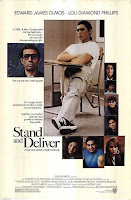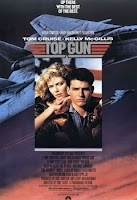
Directed by: George Clooney
Written by: Charlie Kaufman (screenplay), Chuck Barris (book)
There are movies that are true. There are movies that are fiction. And then there are movies like "Confessions of a Dangerous Mind" in which the truth and fiction bleed together.
The movie is an "unauthorized biography" of TV producer Chuck Barris (Rockwell) known for creating and developing shows such as "The Dating Game," "The Newlywed Game," and "The Gong Show." As he rises to the top - or, to some, bottom - of television celebrity, he is simultaneously dragged into working for the CIA as an international assassin. All the while, he strings along long-time girlfriend Penny (Barrymore). The question is, how long can he keep up the juggling act? And which will destroy him first - his secret agent work, his television career, or his hollow love life?
(Side note: In this post, any reference to "Chuck Barris" will be a reference to the character in the film, not necessarily the real person. Although I realize that Barris is a real person and that the film purports to tell his life story, it is obvious that much embellishment and dramatization occurred. So, to prevent confusion, and to make the text clearer, Barris will simply be described as a fictional character.)
George Clooney's rookie effort as a director was strong, but ultimately evident as a rookie effort. The film's strengths lie in its actors and its stories.
All of the actors, from Rockwell and Barrymore on down - including Clooney himself, Rutger Hauer, and a brief appearance by Maggie Gyllenhaal - are absolutely fantastic. The characters are rich and consuming, and at no point does the audience slip into thinking of the actors as actors. Each performance is compelling and believable, although the plot of the film pushes the extent of belief.
The film follows three different story threads out of Barris's life: his TV production work, his romantic affair with Penny, and his involvement with the CIA. Each of these angles could have been a separate movie, but are combined and balanced in this film. In this way, we see Barris as a much more complex and deep character than if we'd only been exposed to one side of his life. The three different stories are juggled around well, always leaving you wanting more of one before moving on to the next.
One problem with the film was that it could have been edited down a bit. A few scenes run longer than necessary, and a couple scenes were harder to place within the larger narrative arcs. (Admittedly, these parts had significant symbolic value - but a symbol is most effective when grounded within the story itself and not used tangentially.)
The visual style was artistic and jarring. Unfortunately, it felt like some of the shots and design was used simply to use those specific shots and design. Again, like the symbolic scenes, these features could have been more effective if they'd been used as an element to advance the story. Instead, by the end, they'd lost their value.
The movie was impressive and is well worth watching, if only to see Sam Rockwell dominate his role in a way few actors could have accomplished. Don't be discouraged by the challenges presented in the first few scenes - it pays off later. Although Barris's life may have collapsed like a house of cards, this movie does not.
 Written by: Ronald Blumer
Written by: Ronald Blumer
































